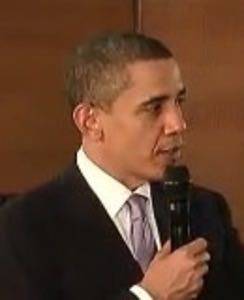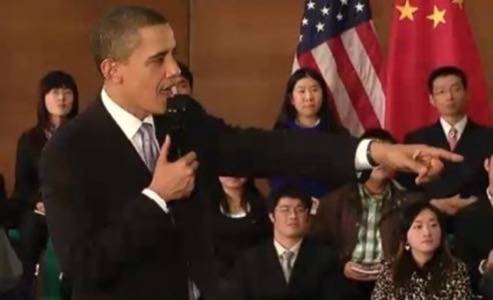Barack Obama spoke to a group of Chinese students tonight at a town hall in Shanghai. The meeting was streamed live, worldwide on the Whitehouse website and on the Whitehouse’s Facebook page. He was asked a limited number of questions by the audience and one was about Twitter, which has been blocked in China since July.

Got that? The President went to China, was asked about Twitter and it was streamed live on his Facebook page. How the world has changed.
Obama was asked by a student, “Do you know about the great firewall and should we be able to use Twitter?” His reply: “I have never used Twitter but I’m an advocate of technology and not restricting internet access.” (via Breaking News Online)
He’s never used Twitter! Shocking, given that his account with 2.6 million followers has even been “verified” by Twitter headquarters! (Update: As a reader points out in comments below, the Twitter website says that verification is given to accounts representing organizations and public figures, but doesn’t verify who’s actually Tweeting the Twittle.)
Of course Obama needn’t use Twitter or Facebook at all, much less effectively, so long as he hires people who are capable of making effective use of cutting-edge communication technologies in his Administration’s name. Clearly, he can. It might not hurt to add a staffer’s initials to the messages that are not paraphrases of any official statement, though. That’s what Britney Spears does with her Twitter account.

Twitter is Important
Meanwhile, is this not a changed international communication landscape? In these frictionless self-publishing tools, with real-time worldwide message delivery and network effects in listening, distribution and learning – there is something so powerful that it’s a matter of international diplomacy.
Whitehouse Press Secretary Robert Gibbs scoffed at Twitter this summer and told CNN the site was blocked on Whitehouse computers, something that subsequent reports apparently disproved but interesting none the less.
It’s no laughing matter, though. The impact of Twitter-like services really is like, in type if clearly not intensity, the changes the world saw with the advent of the telephone and the railroad. CNN and live cable coverage of Tiananmen square, Twittering (or not) from China: these fit into the same category of disruptive tools for international communication.
Maybe you should try it sometime, Mr. Obama. And while you’re at it, you should ask someone to brief you on the movement for distributed social networking standards. A speaking gig in China would have been a great opportunity to sing the praises of decentralized, standards-based, interoperable, free-market competition in communication technologies. That’s the next part of the Twitter story.

If you’d like to join the ReadWriteWeb team in discussing matters of global importance (or not) on Twitter, you can find us here.
















